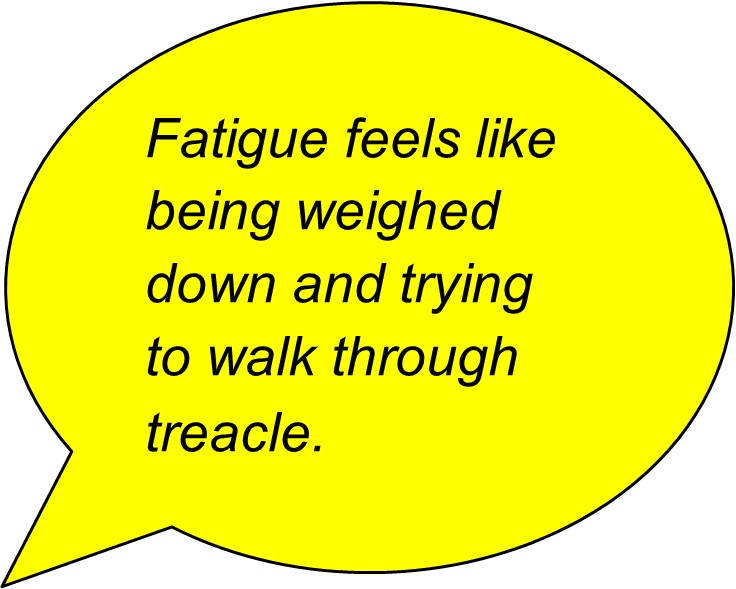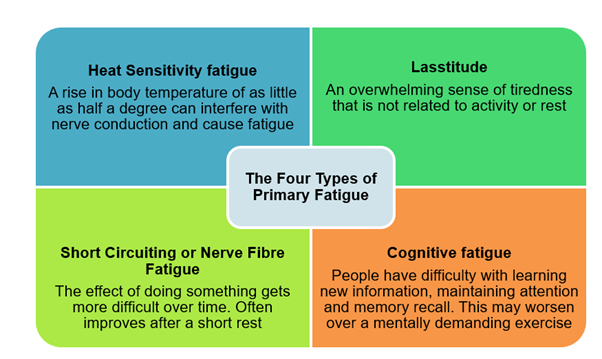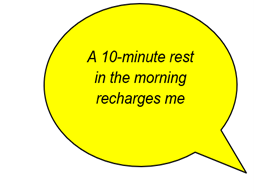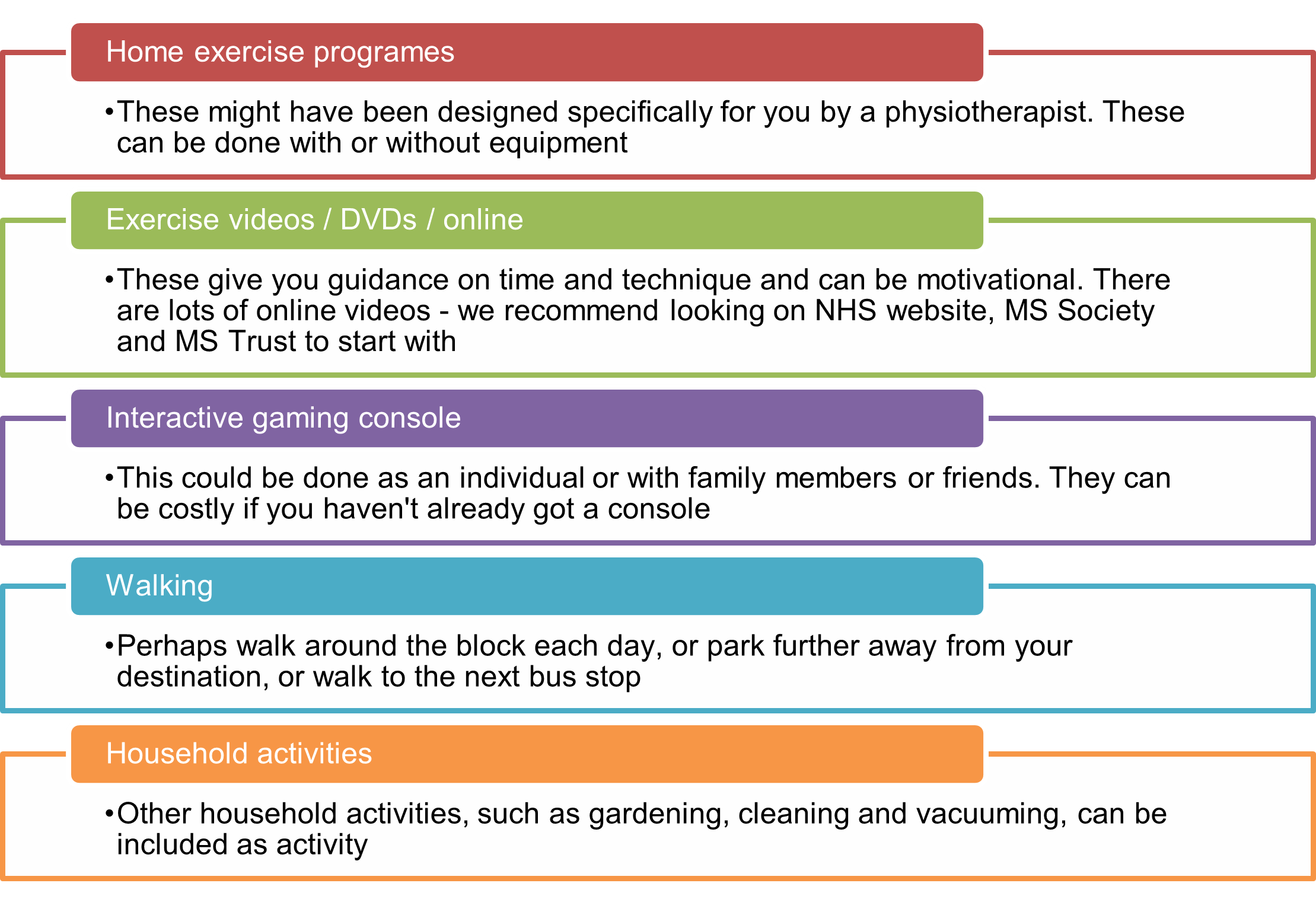Fatigue
What is fatigue?
This is the most common symptom of MS. Up to 86% of people with MS having some level of MS fatigue. It can impact on many aspects of daily life and is described as a feeling of exhaustion that is out of proportion to activity.

MS fatigue is very different from the feeling of being tired or exhausted that people without MS may experience following heavy exercise or a busy day at work.
As an invisible symptom of MS, MS fatigue can be difficult for other people to understand.
MS fatigue is a major cause of stopping working or reducing working hours.
Types of fatigue
Primary fatigue is a type of fatigue caused directly by MS. It happens because the brain and spinal cord have to work around damaged areas to send messages. This takes more effort and energy, so people with MS often feel very tired, even when doing everyday things.
There are four types of primary fatigue.

Secondary fatigue is not directly caused by MS but can impact on fatigue. Things that can make fatigue worse include pain, depression, lack of sleep, anxiety, stress, infection, deconditioning, poor nutrition, or the environment. Some medications may also have side effects of tiredness or drowsiness.
Fatigue Management

Managing fatigue is based around helping people to understand MS fatigue, how to increase energy levels, and how to manage energy in the best way possible. The goal is to help people do as much as they can while living with fatigue. This includes setting goals, using helpful fatigue strategies, and changing unhelpful thoughts that might get in the way.
Top Tips for Managing Fatigue
- Think of yourself as a battery, you need to be kept topped up throughout the day, not to run out of charge
- Take regular rests during or between activities. Rest breaks, top up energy levels. A small 10-minute rest can make a big difference
- A rest means a complete rest, no screens, TV, or social media. Your brain and body need a complete break
- Try and rest before fatigue sets in
- Plan, what needs to be done and what can realistically be achieved
- Try and spread out activities throughout the day, week or month
- Adopt the “Time Not Task” approach, replace task with time, for example replace clean the house with 15 minutes of housework
- Prioritise activities. Focus on the most important tasks
- The 4 D's, Do, Defer, Delegate or Ditch. Sometimes deferring a task by a few hours or days can make a difference. Delegating tasks, asking for help from others
- Save energy and grade tasks. Do tasks in the easiest, most efficient way, such as sitting down to shower or to do food preparation
- Avoid hot baths and showers. Keep cool with fans and cold drinks
- Use mindfulness and relaxation techniques
- Build in routines.
- Adopt the right attitude for change. Be aware of and challenge unhelpful thinking patterns
- Optimise energy levels through healthy eating, staying active, getting enough sleep, reducing stress, and improving mood.
If you feel you would like support with managing your fatigue, then please contact the MS Service helpline or speak to your MS nurse/practitioner and they can refer you to the MS Occupational Therapists for fatigue management education and support.
Useful Links
The MS Trust and the MS Society have useful booklets on fatigue which can be found in the links below.
The MS Society run a very useful online fatigue management course which can be found in the link below.
There is also an excellent MS Trust podcast on fatigue which can be found here: https://www.youtube.com/watch?v=usH5LYmEZD0
See Sleep, Mindfulness and Relaxation sections for more useful information.
Family planning and pregnancy in MS
Introduction
If you have Multiple Sclerosis (MS), there are some key things to think about when planning a family, including contraception. These should be considered whether you are planning to have a baby in the near future or not.
While family planning and pregnancy are often discussed in relation to women, it's also important for men with MS to consider how the condition might affect their plans to start a family.
Some key points:
- MS will not usually directly affect fertility, pregnancy, labour or giving birth.
- Some MS disease modifying treatments (DMDs) cannot be used when trying for a baby, during pregnancy, or breastfeeding. This will also apply to men trying for a baby with certain DMDs.
- Having a new baby is exhausting and can be difficult for anyone, but can be more challenging for someone with MS. It is important to be kind to yourself and accept and ask for help.
- Pregnancy does not increase the risk of worsening long-term disability.
- Overall, relapse rate has been found to be similar during the pregnancy twelve months (nine months of pregnancy and three months following the birth) as in a non-pregnancy year. Whilst there is usually a reduction in relapse rate during pregnancy, about a quarter of untreated women (those not a disease modifying drug) will experience a relapse in the first three months following the birth of their baby.
I have no plans to conceive
MS does not affect fertility of men or women with MS. It is important to use contraception if you are not planning to conceive.
Contraception choice may be influenced by MS symptoms, MS disease modifying drugs (DMDs), and other treatments you are taking:
- Some MS DMD treatments are not safe to use during pregnancy and may affect quality of sperm
- Some symptoms of MS can make the use of some methods of contraception more difficult to use
- Some medications used to treat symptoms of MS can increase the risk of hormone-based contraception failing
About 45% of pregnancies are unplanned. If you unexpectedly become pregnant, please contact the MS Service helpline to be booked into an appointment for an MS pregnancy consultation.
I am planning on trying for a baby
If you are planning on trying for a baby, please contact the MS helpline and ask to be booked in for a pre-conception consultation with one of our nurses/practitioners.This is usually a video consultation. At this appointment we will:
- Talk about planning your pregnancy and offer you advice and information regarding all aspects of your MS and pregnancy
- Ask you about previous pregnancies (if you have had any) and discuss any previous problems you may have had
- Discuss MS symptom areas which may be relevant to pregnancy, labour, and the early days of being a parent
- Discuss your current MS medication and whether it is safe to continue through the conception, pregnancy, and breastfeeding. It may be that we advise you to switch treatment during this period
Is there anything else I can do to help myself if I want to get pregnant?
- If you smoke, we advise that you stop. You can refer yourself to smoking cessation programmes or support services to help you to do this. Smoking is harmful to you and your unborn baby. It is also more difficult to conceive if you do smoke
- Start taking folic acid for 3 months prior to conceiving and during the first 12 weeks of pregnancy
- Take a vitamin D supplement (400-800 IU per day)
I am pregnant
Make an appointment with your community midwife as early as possible. Contact your GP surgery to do this.
If you discover you are pregnant, inform the MS Service helpline. You will be booked into an appointment for an MS pregnancy consultation.
We do not advise suddenly stopping medications when you find out you are pregnant.
If you or your partner has MS and you become pregnant, the risk of miscarriage or serious pregnancy problems is not significantly higher than usual.
MS is not associated with an increased risk of blood pressure problems (pre-eclampsia) or growth problems for the baby. Extra growth scans are not required.
While many women find their MS symptoms improve during pregnancy, some symptoms may worsen, such as fatigue, heat sensitivity, bladder, and balance symptoms.
Urinary tract infections (UTIs) are more common in pregnancy and need to be identified and treated quickly. Contact your GP if you think you have a UTI.
Recommendations during pregnancy
- If you smoke, we advise that you stop. You can refer yourself to smoking cessation programmes or support services to help you to do this. Smoking is harmful to you and your unborn baby. It is also more difficult to conceive if you do smoke
- Folic acid should ideally be started 3 months prior to conception and continued until 12 weeks gestation
- Vitamin D (400-800 IU per day) should be taken
- Relapses can be treated with corticosteroids during pregnancy, but only on the advice of your neurologist or MS service
- MRI scans are not contraindicated in pregnancy; however, gadolinium contrast (the dye that is sometimes used for MRI scans) should be avoided
Labour and delivery
MS does not automatically mean a pregnancy should be considered higher risk. A 'midwifery-led' delivery may be an option should you wish; this should be discussed with your midwife or obstetrician.
We would normally recommend a vaginal delivery as the safest type of birth for women with MS, but individual risk factors and circumstances need to be taken in to account. We are always happy to discuss options for delivery, in relation to your MS, with you and your obstetric team.
The full range of labour pain relief are available to women with MS. Your obstetric team can discuss this further with you.
Postpartum (Postnatal)
We support women's choice to breastfeed and offer individualised advice about the safety of medications in relation to breastfeeding. Some MS disease modifying drugs (DMDs) are not safe to use whilst breastfeeding – if you have any questions regarding this, please discuss with your MS nurse/practitioner.
Women with MS should continue to take vitamin D and their infants should be given vitamin D in line with standard advice.
People with MS may be more likely to feel low, depressed, or anxious after having a baby. If you feel this way, it's important to ask for help. You can speak to your health visitor, GP, or contact Steps2Wellbeing (see below) at any time if you're worried. More information on mood and MS can be found here Mood Section.
People with MS may require additional support from family and friends in the postnatal period. It is important that you accept help and ask for it.
MS symptoms you usually live with may become worse in the early days after having a new baby. It is especially important to let your MS Service know if you are having problems with your bladder or bowel function. We can also give advice on other symptom areas, including advice from MS Specialist Occupational Therapists and Physiotherapists, if required.
MS Preconception and Pregnancy Consultations
Planning a pregnancy and being pregnant with a long-term condition can be daunting. We run preconception and pregnancy consultations to provide specialist advice and reassurance.
These consultations are run by an MS Nurse or Practitioner with expertise in Pregnancy in MS; they will offer individual advice unique to you and help to support you through your pregnancy and beyond.
They may also link with your midwife, neurologist, and other members of the MS Service in order to give you the best advice and support.
You can refer yourself for one of these consultations by contacting the MS Service on 0300 019 2362 or This email address is being protected from spambots. You need JavaScript enabled to view it..
Further information
UK consensus on pregnancy in multiple sclerosis: 'Association of British Neurologists' guidelines UK consensus on pregnancy in multiple sclerosis: 'Association of British Neurologists' guidelines | Practical Neurology (bmj.com)
MS Trust: https://mstrust.org.uk/a-z/pregnancy
MS Society: https://www.mssociety.org.uk/pregnancy
MuMS UK - an online Facebook group who discuss all aspects of pregnancy and parenting, and for those who are thinking of starting a family: https://www.facebook.com/groups/351614711568755/
Live Well Dorset – support to stop smoking: https://www.livewelldorset.co.uk/stop-smoking
Steps2wellbeing - Free, confidential, NHS self-referral service for people experiencing problems with low mood/ depression, anxiety, stress, or other common mental health problems: www.steps2wellbeing.co.uk
Diet and MS
A healthy diet
The following is taken from the American National Multiple Sclerosis Society:
Diet and fluid intake are important in multiple sclerosis. Lifestyle factors such as healthy eating, fluid intake and exercise, as well as smoking, increase the risk of getting MS and can affect how the disease progresses.
A healthy diet may have a positive effect on your MS for several reasons:
- A steady and healthy body weight is associated with less risk of MS activity (such as relapses and lesions on MRI) and related disability. Diet has a strong relationship to body weight and cardiovascular (heart and blood vessels) risk factors, such as high blood pressure, high cholesterol, and diabetes. Cardiovascular risk factors:
- are associated with higher levels of MS activity and related disability
- can lead to other health issues, such as heart disease and stroke
- Diet affects the number and type of bacteria that live in the gut (microbiome), which in turn has important effects on the immune system that may be relevant for MS
- Nutrients from food—like vitamins, fatty acids, and amino acids directly affect how the immune system and brain work
Currently, there is no specific diet that has been proven to benefit MS, or specifically alter MS progression or relapse rate. The most important thing is getting the right and proper balance of nutrients for your body and brain function. The best way of getting nutrients is through food and fluids.
Experts recommend the following for good health:
- Prepare meals at home as much as possible
- Include colourful fresh fruits and vegetables daily
- Choose lean proteins and healthy fats
- If you eat grains, choose wholegrains over refined grains
- Consider adding herbs and spices to add flavour to meals
- Avoid, or limit, processed foods and added sugars as much as possible
The NHS recommends a balanced diet which will provide you with all the nutrients needed to be as healthy as possible. This includes:
- At least 5 portions of a variety of fruit and vegetables each day
- Opting for high fibre and wholegrain starches such as brown rice, wholewheat pasta and potatoes
- A good variety of protein including beans, pulses, fish, eggs or meat
- Some low-fat dairy, or dairy alternatives, such soya and coconut yoghurts and drinks
- Food high in fats, salts and sugars (such as cake and chocolate) should be eaten in small amounts, and unsaturated oils and spreads should be opted for where possible
- Drink plenty of fluids (6-8 cups of water per day is the recommended amount, but this will depend on your height, weight and activity levels)
The Eat Well Guide can be accessed here: The Eatwell Guide - GOV.UK (www.gov.uk)
Even though getting nutrients from food is best, some people might need to take supplements. Please see supplements for more details regarding some that can be considered beneficial in MS.
Special Diets for MS
There is a lot of information about special diets for MS on the internet. Despite this it is currently still recommended that a healthy balanced diet, as described above, is the best diet for someone with MS.
If you are considering a specific diet, it is important to make sure that there is proof (scientific evidence) the claims about the diet are true.
The important thing is to make sure you're not missing out on the healthy nutrition you need, as some diets include restrictions which might be unhealthy, or make it hard for some people to stick to.
Healthy body weight
Maintaining a healthy diet and body weight is important for everyone's overall health and well-being and will help to manage some symptoms of MS. A good diet can help improve symptoms such as low mood, fatigue, constipation and can help boost your immune system. A poor diet can make some MS symptoms worse, and increase pain or weakness. A poor diet can also increase your weight and cause other medical conditions such as diabetes, vascular disease and osteoporosis which can in turn make living with MS even harder.
Research has shown people who are obese are likely to have higher numbers of MS lesions (areas of MS damage) than people who maintain a healthy weight. Obesity is also linked with a higher risk of disability in people with MS.
Evidence is starting to show that whilst exercise and activity has huge health benefits, it doesn't play as big a role in weight management as previously thought. Diet is the most important factor in managing weight.
Live Well Dorset has a team of advisors and coaches who can offer support to those struggling to maintain a healthy weight.
Dietary tips to help manage MS symptoms
Bladder
- Certain foods and fluids can irritate the bladder. To help manage this it is recommended to drink plenty of water to avoid strong (concentrated) urine. Don't be tempted to cut back on the amount you drink to reduce your trips to the toilet, as concentrated urine can irritate the bladder and cause infection
- Caffeine, spicy foods, fizzy drinks, alcohol and fruit juices should be cut down, or avoided, as these can also irritate or stimulate the bladder
- Maintaining a healthy body weight can also reduce bladder symptoms, as being overweight increases pressure on the pelvic floor
- See bladder for more information on the bladder and MS
Bowels
- Eating at regular intervals, eating plenty of fibre and drinking plenty can help avoid constipation and improve bowel management. Seeds and powders, such as flaxseed, can also be added into the diet to help aid bowel movements
- The NHS has helpful information in how to get more fibre into your diet and good foods to help your digestion: Digestive health - NHS (www.nhs.uk)
- See bowel for more information on the bowels and MS.
Fatigue
- Fatigue in MS is complicated and not just caused by food, but eating enough healthy, nutrient-rich meals can help give your body the energy it needs. This means including lots of fruits, vegetables, and whole grains to keep your energy steady during the day
- Sweet, sugary foods aren't recommended as these tend to give you a blood sugar spike, followed by a blood sugar crash, leaving energy levels low
- Plenty fluids are also needed to help manage fatigue levels and are an important factor in maintaining a healthy weight
- See fatigue for more information.
Mood
The organisation Mind advises the following information on diet, mood and mental health:
- Eating different fruits and vegetables can add a good range of nutrients to your diet. These nutrients help to keep us mentally as well as physically healthy
- Diets higher in protein can support your mental health. Protein contains chemicals called amino acids, which your brain needs to produce chemicals called neurotransmitters. These help to regulate your thoughts and feelings.
- Caffeine can:
- Make you feel anxious and depressed
- Disturb your sleep, especially if you have it just before bed
- Give you withdrawal symptoms like feeling irritable or depressed, if you suddenly stop having it
- Your brain needs certain fatty acids, such as omega-3 and omega-6, to keep it working well. You can find these healthy fats in:
- Nuts and seeds
- Avocados
- Oily fish, such as sardines and mackerel
- To help overcome low mood, it is recommended that alcohol is avoided. It is also known that alcohol reduces the B vitamins in our bodies which play a role in the development of our brain chemicals directly impacting mood.
- See mood for more information about low mood.
Dietary support
If you are struggling with food preparation due to fatigue, reduced strength in your hands, or other symptoms, the MS Trust provides tips on food preparation which can be found here: Diet and symptoms | MS Trust.
See living well with MS for more details.
Links for further information
The Eatwell Guide - NHS (www.nhs.uk)
The Eatwell Guide - GOV.UK (www.gov.uk)
Brain health: A guide for people with multiple sclerosis (msbrainhealth.org)
Exercise and activity
Getting active can be achieved by either being more physically active or exercising. This can sometimes be challenging for people with MS. Over the last 20 years, there has been lots of research that has proved that exercise and activity is beneficial. It can manage symptoms of MS and improve your general health and wellbeing.
Physical Activity has been described as any body movement that works your muscles and uses more energy than you use when resting. This could include activities such as housework and gardening.
Exercise is planned, structured and repetitive to condition any part of the body. Exercise improves health, maintains fitness, and can be a type of physical rehabilitation.
Why is it important?
People who participate in regular physical activity can improve general fitness, lower the risk of chronic diseases (e.g., heart disease and Type 2 diabetes), and can help weight management alongside managing your diet – see diet. Being active can also help support your health as you get older.
Research shows that physical activity can help self-esteem, mood, sleep quality, and energy, as well as reducing your risk of stress, depression, and dementia.
Deconditioning in MS
It is known that people with MS are usually less active than other adults who don't move much. When you don't get enough exercise, your fitness can go down—this is called deconditioning.

Choosing the best activity for you
Physical activity is most helpful if it is done on a regular basis. You are more likely to be motivated if it is something you enjoy. It is worth trying a few activities to work out which ones you enjoy. You may choose just one activity, or find a few, that you want to continue a regular basis.
Getting Active at home
Doing activity at home has many benefits. It can be adapted around your lifestyle, and you can break the activity into smaller blocks. It is possible to use equipment at home that will help you to be active and achieve your goals.

Hints and tips when getting active at home:
- Environment - make sure that you have a clear and safe space
- Balance - consider something sturdy nearby to steady yourself
- Set yourself realistic targets that are achievable
- Routine - some people find it useful to exercise at the same time each day or set an alarm on your mobile phone
- 'Moments of movement' – exercise can be fitted into small time frames during the day, such as waiting for the kettle to boil, or when brushing your teeth
Getting active in the community
Joining a group activity
Socialising and being active with others can be motivational and help your wellbeing. A good instructor should be able to adapt exercises to your ability level, or provide an alternative exercise, whilst guiding the group.
In a group setting, it is important to take responsibility for making the instructor aware if you are finding certain exercises challenging and need to take a break due to your fatigue or feeling too warm. Everyone has different levels of fitness (whether they have MS or not), so don't compare yourself to other people or try to compete.
Joining the local gym
Most gyms will offer an induction to help develop a programme to meet your needs and make sure you know how to work the equipment. It is likely that within the gym there will be instructors with different levels of training and experience. If you feel that you have specific needs, mention this when booking the induction so they can offer you an appointment with a staff member best able to guide you through your induction and personal plan.
Choosing the right venue
When getting active in the community, consider the practicalities and how you would manage them. For example, how will you get to the venue, walking distance and accessibility? Are changing and toilet facilities suitable for your needs? Consider visiting venues prior to the activity you plan to participate in.
What options are available for me in Dorset?
- LiveWell Dorset | Health & Wellness Coaching | Free Advice & Support · LiveWell Dorset – this website is a great resource to help you find local classes which could be suitable for you and can also help you with coaching and support to improve your health and wellbeing
- Contact the local MS Society branch for details of exercises classes Dorset Group | MS Society
- Local community centres and church halls often have different community run exercises classes
- Choosing the right exercise | MS Trust – there are some useful links here to find local disability sport associations
- See Support Networks for some other local and virtual options
Tips when starting exercise
Start slowly and don't try to do too much, too soon. Let your body get used to the new activity and figure out which exercises are comfortable for you. Over time, you'll be able to gauge what your limits are.
Overheating
Heat sensitivity is a common MS symptom. If you find that you get hot and uncomfortable when you exercise, try to cool the environment you are in. Take off a layer of clothing, open a window or go outdoors. A fan or a cold-water spray might also be useful, as can having a cool bath or shower before you start to exercise.
Research shows that drinking iced water before exercising can help people with MS exercise for 30% longer and reduce fatigue following aerobic exercise.
Fatigue
It is important to recognise, both when exercising and in daily life, that it is not a good idea to 'push through' fatigue. You may end up feeling worse, often for days afterwards. It may be better to break your exercise into smaller chunks.
Choosing the right activity
These national websites have suggestions of activities and exercises that might suit your ability.
- Choosing the right exercise | MS Trust
- Simple exercises for MS | MS Society
- Exercise at Home - WheelPower
Locally there are also these options for those who live in East Dorset.
Counselling
What is it?
Counselling is a type of talking therapy. It involves talking to a trained therapist about your problems and concerns and can involve exploring ways to manage emotional issues. A counsellor won't give you advice or tell you what to do. They'll help you talk through your issues and try to help you find ways of coping or create an action plan to help you.
Counselling may also be useful to family members of the person with MS.
Counsellors work in different ways, but sessions should be tailored to you. There are various ways counselling can be delivered:
Setting
- Face-to-face – here you see the counsellor in person, usually at their practice.
- Telephone – these sessions take place over the phone, rather than in person, this can be useful if it is difficult for you to attend face-to-face sessions.
- Online – this gives you a chance to protect your anonymity and can be useful if you prefer not to speak directly to a counsellor. It can also give you more time to think about what you want to discuss.
- Virtual – video appointments.
Individual or Group Sessions
- Individual – seeing a counsellor on your own allows you to concentrate on your own feelings in private.
- Group sessions – may be helpful if you want to discuss your issues with others who are experiencing similar problems.
It is not unusual to feel anxious before your first session of counselling. It's likely that you'll be asked some questions to help your counsellor understand what's worrying you and how think about things. You'll probably be asked why you want counselling and what you're hoping to get from it. They'll also ask about your situation and any issues you are experiencing. This information will be used to help you.
As counselling can involve discussing upsetting or painful issues, it may be difficult at first and it's not unusual to feel worse to begin with.
Counselling is not a 'quick fix' and it's rare for a single session to be enough. It is important to build up a trusting relationship with your counsellor, where you feel safe and can be honest about your worries.
(Reference: MS Trust https://mstrust.org.uk/a-z/counselling)
Self-referrals
Steps2Wellbeing is available to adults over 18 registered with a GP in Dorset. They offer talking therapies including counselling, online courses, Cognitive Behavioural Therapy (CBT) and guided self-help to support people with common mental wellbeing issues like depression and anxiety.
Information about how to find a therapist – from the British Association of Counselling and Psychotherapy (BACP)
Finding a therapist – from the UK Council for Psychotherapy (UKCP)
Information on how to find a registered counsellor or psychotherapist – from the Counselling Directory









